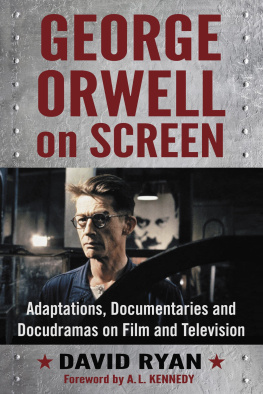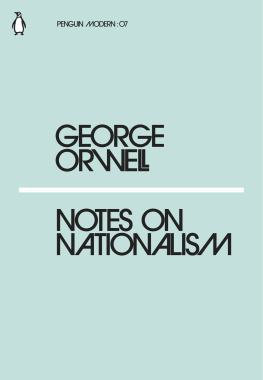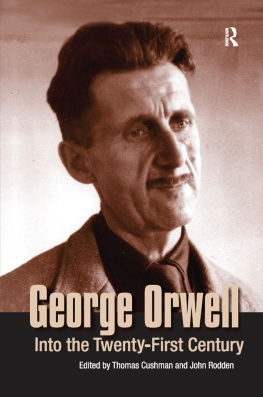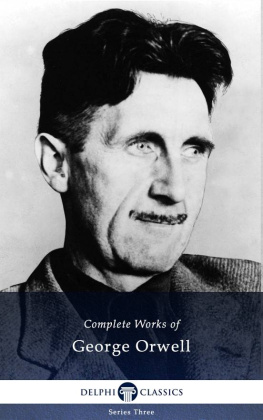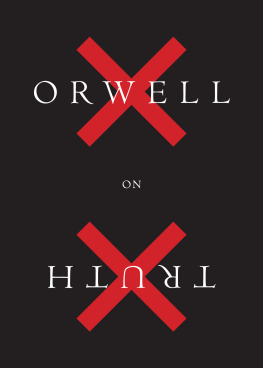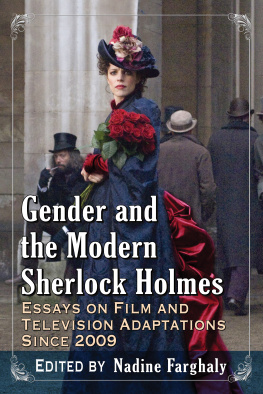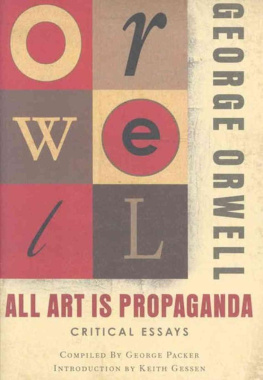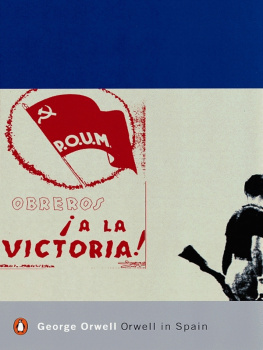
George Orwell on Screen
Adaptations, Documentaries and Docudramas on Film and Television
David Ryan
Foreword by A.L. Kennedy

McFarland & Company, Inc., Publishers
Jefferson, North Carolina
LIBRARY OF CONGRESS CATALOGUING DATA ARE AVAILABLE
BRITISH LIBRARY CATALOGUING DATA ARE AVAILABLE
e-ISBN: 978-1-4766-3313-8
2018 David Ryan. All rights reserved
No part of this book may be reproduced or transmitted in any form or by any means, electronic or mechanical, including photocopying or recording, or by any information storage and retrieval system, without permission in writing from the publisher.
Front cover: John Hurt as Winston Smith in the 1984 film Nineteen Eighty-Four (Virgin Films)
McFarland & Company, Inc., Publishers
Box 611, Jefferson, North Carolina 28640
www.mcfarlandpub.com
For my friends and loved ones,
who are more equal than the others.
Foreword by A.L. Kennedy
One of the less grim talking points of 2017 was the uptick in sales of 1984, George Orwells classic denunciation of totalitarianism, pitting love of Big Brother against love of Life, Liberty and so forth. In the intervening time we have been able to appreciate the size and frailty of and so forth to a degree that far-sighted and gleefully grim Orwell would have appreciated.
Completing 1984 was the last creative act in a life foreshortened by stress, injury, a working life plagued by poverty and a tendency towards bohemian self-harm, black tea and chain smoking. Despite chronic ill-health and a relatively late start as a writer, Orwells output before his death at 46 was monumental, amounting to a waist-high stack of reviews, essays, letters, radio scripts and novels. A coddled and healthy author in an age of easy, computerized rewrites would be hard-pressed to produce so much and so much of great quality, insight, bleak humor and passionate humanity. Orwells late nights and self-inflicted privations speak of an obsessional streak, and his startling commitment to the human projectfighting for the republic in Spain, endlessly helping young authors and needy cases, polemicizing on behalf of the powerlesshas allowed some to find in him the qualities of a tall and whispering secular saint.
Orwells passions and obsessions seem more than averagely apt to attract answering passions and obsessions among readers and among the necessary guardians of a literary life cut short. This can lead to factionalism and there are certainly rival camps of Orwellites, but at their best those who love and honor Orwell form an eclectic band of academics, enthusiasts, campaigners and readers, each personally and often rather gloriously inspired by the work. The Orwell Foundation, for example, runs a vibrant calendar of lectures and events and organizes, among other initiatives, the annual Orwell Prize for political journalism, the premier award for political writing in its widest, most challenging and beneficent sense.
Which brings me to this latest, rather glorious project of passion and entirely fruitful obsession. You will find David Ryans George Orwell on Screen is an astonishingly comprehensive record of, as we might guess, film and television adaptations of Orwells work. You may be surprised by the humor here, although those familiar with Orwells deadpan asides and animal-based quips will feel mightily at home. Ryan provides unmistakable affection and a dogged, almost miraculous accumulation of detail that, along with remarkable anecdotes and literary asides, will please the most ardent fan of Orwell and Orwell biography. Those who come for the media studies may be thoroughly engaged by the ghostly figure of Orwell, emerging from a mass of research. Those who come for an Orwell fix may stay for an oblique record of a decline in television production standards and commitment to quality drama on both sides of the Atlantic. All this, plus Richard Burton and some farting rats.
Ryan happily narrates how his gradual slide into Orwell-obsession became a full-blown book after 25 years of research. Beginning by reading Animal Farm at school (something which can extinguish any young readers enthusiasm) Ryan was embraced by the Orwell Society and moved on to dinner with actor Ronald Pickupwho once played Orwell, carefully perfecting his hoarse, soft, Etonian locutionand then a trip to Jura, where Orwell completed and then rewrote 1984, along with Orwells son Richard Blair. (Orwells real name was Eric Blair.) Ryan is an enthusiastic narrator, injecting just enough of his investigative travails and serendipities to enliven what might have been simply a dry list into an agreeable artistic adventure.
We move from Orwells own dramatic adaptation of Animal Farm in 1947 to a surprise pick of usually dapper and debonair David Niven as the first Winston Smith in 1949, with a side mention of Lorne Greene, homely and cheerful star of Bonanza, as the Inquisitor in an early CBS version. Characteristic of Ryans style, we also learn CBS was so anti-sex that they insisted writers rename Big Brothers Junior Anti-Sex League.
The BBCs ground-breaking 1954 TV version of 1984, directed by the great Rudolph Cartier, remains of the days when a political drama could genuinely shock without being prurient, and without giving rise to wholesale calls for the UKs currently tottering public broadcaster to be mobbed with flaming pitchforks at sunset. (Although its shocking effect might conceivably have led to the death of a Herne Bay beauty queen of the previous decade. Ryans talent for digging out bizarrely wonderful details strikes again.) The pitchforks might still have been out had viewers known that the rats used in Room 101s torture were happy, fat and rampantly gay.
We move on to learn that the CIA-backed a Cold War animation of Animal Farm, and that the film was famously hated by Romanian dictator Nicolae Ceauescu and therefore screened on New Years Day 1990something which would surely have pleased Orwell.
We discover that David Bowie, among others, pondered a 1984 musical. (Its surely only a matter of time before Londons musical-obsessed West End follows up on its recent, highly successful stage version with something more family friendly and toe-tapping.) And theres a bittersweet mention of David Attenborough as masterful and inspiring controller of BBC 2.
A description of the BBCs novel production of Keep the Aspidistra Flying will remind you of scriptwriter Robin Chapmans genius and the possibility that television drama once didnt have to involve multiple casualties or medical emergencies.
Ryan doesnt just deal with dramatic productions; he also looks at long-forgotten documentaries. The very idea of Jack Bonds Orwell documentarywith Malcolm Muggeridge interviewing Orwells second wife, Sonia Orwell, long-time friend Cyril Connolly and sister Avril Dunnis mind-bending. The fact that its preserved and yet virtually unknown is heartbreaking. The fact that Muggeridge was a happily voluntary crewmember somehow delights me. And I was even more delighted by Connollys quoted comment on Orwells famously Eyoreish nature: Its a bracing pessimism, a feeling that once you admit the worst, everythings a bit more fun all round.
And Colin Blakely was, of course, the perfect TV drama casting to play George Bowlinga character cursed with dense suppressions and an anxiously soapy neck. I want to see that version of
Next page
